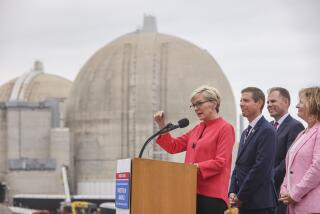N.D. Officials OK Dump Study, Get Dumped by Voters
- Share via
CARSON, N.D. — When the federal government dangled a $100,000 grant to study how nuclear fuel rods can be temporarily stored, commissioners in a sparsely populated prairie county in North Dakota were quick to bite.
The voters bit them back.
It took a month for Grant County to win one of seven study grants last fall, but opponents were just as quick to organize a special election. All three commissioners were thrown out of office in March.
The bitter fight became so acute that some relatives refused to speak to each other. “There still is bad blood out there,” county Auditor Ervin Schatz said. “There’s no two ways about it.”
Ray Meyer, a four-term state legislator who disclosed in February that he would not be seeking reelection for business and family reasons, thought the grant would bring in money and jobs. The commissioners agreed.
“The problem in Grant County, like most rural counties, is we have an aging population, a declining tax base, and we continue to need services from government that have to be provided by fewer and fewer people,” Meyer said.
The Department of Energy is searching for a 500-acre, above-ground, temporary dump site for spent fuel rods from nuclear reactors before moving them to a permanent site.
The 1,600-square-mile county, home to 3,500 people, was among the first applicants, and got the grant in November. Other grant recipients were Fremont County in Wyoming and five Indian reservations in New Mexico, Oklahoma, Minnesota and Washington.
The Mescalero Apache tribe in New Mexico already has gone on to apply for Phase II, which includes a $200,000 grant for more studies and the identification of potential sites.
Grant County Commissioners Lloyd Ulmer, Ray Miller and Marley Sprecher, who lost in the March 10 special election, said the dump study did not necessarily mean that a dump would be built.
But residents complained that they should have been allowed to decide whether the county should apply for the money. “The biggest thing was that the people were denied their right to vote,” said Ulmer’s brother-in-law, Leslie Roth Sr., one of three newly elected commissioners.
Recriminations were fierce.
“Before the election he (Roth) didn’t even talk to me in the cafe,” said his sister Nyla Ulmer, who is Ulmer’s wife. “So that tells you where we stand.”
Roth said he has no ill feelings toward his sister and her husband. He was just too busy to speak to them.
“I hope this blows over and people get back to normal,” he said. “It’s hard on the community when you have something like this, tears people apart.”
The ousted commissioners said the $100,000 came with no strings attached. It was used to set up an information center and allowed several residents to tour nuclear power plants.
The election drew 1,861 voters, nearly two-thirds of the county.
Ulmer and Sprecher, each with one year left on their four-year terms, came in third and fourth in a field of five, losing to Roth and Larry Grade. Miller, who had three years left on his term, lost to Wendall Dawson by a vote of 913 to 593.
The next day, the outgoing commissioners notified the Energy Department that the study would be halted. They expressed no regrets. “We can go down the street and look everybody in the eye,” Sprecher said.
The new commissioners were sworn in March 16.
“I think it was just the fact that people did not want to take out-of-state garbage and make us a dumping ground,” said Martin Ketterling, vice chairman of Citizens Against a Nuclear Waste Dump in Grant County. “Certainly being high-level nuclear waste probably played in the minds of a lot of people.”
The issue hasn’t gone far away. Officials in neighboring Adams County said recently that they are interested in a study grant.
“We’d like to think people in this community are at least willing to look at things before saying no,” said Jeff Rotering, president of the county development corporation.
More to Read
Sign up for Essential California
The most important California stories and recommendations in your inbox every morning.
You may occasionally receive promotional content from the Los Angeles Times.













